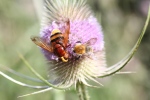 Agri-environment schemes aimed to promote biodiversity on farmland have positive effects on wild bees, hoverflies and butterflies. Effects on diversity and abundance were strongest when agri-environment schemes prescribed sowing wild-flowers, the more flowering species the better. Organic farms, set-aside land or fields receiving reduced amounts of fertilizer and pesticides generally hosted more wild pollinators than conventionally farmed land. Jeroen Scheper of Alterra Research Institute and colleagues demonstrated this by analysing the results of 71 studies that had looked at the effects of implementing agri-environment schemes in various European countries. Agri-environment schemes aimed to promote biodiversity on farmland have positive effects on wild bees, hoverflies and butterflies. Effects on diversity and abundance were strongest when agri-environment schemes prescribed sowing wild-flowers, the more flowering species the better. Organic farms, set-aside land or fields receiving reduced amounts of fertilizer and pesticides generally hosted more wild pollinators than conventionally farmed land. Jeroen Scheper of Alterra Research Institute and colleagues demonstrated this by analysing the results of 71 studies that had looked at the effects of implementing agri-environment schemes in various European countries.
'There has been a lot of debate about the effectiveness of agri-environment schemes so the results were a bit of a surprise' said co-author David Kleijn. 'We don't know whether the results indicate that agri-environment schemes boost pollinator populations or that they temporarily attract pollinators from surrounding areas. Positive effects were restricted to very common species. However, recently there has been a lot of concern that the decline of pollinators might result in pollination limitation of insect-pollinated crops. Wild bees are excellent pollinators and common species do just the trick. All you have to do to enhance the wild pollinators of crops on farmland is increase flower abundance in field margins roadsides or crop edges.'
The examined agri-environment schemes seem less effective in enhancing endangered pollinator species. Endangered species were rarely observed during the field studies. 'Most of the studies used for the analyses were carried out in North-western Europe where farming is relatively intensive. In these areas endangered species are restricted to semi-natural habitats and nature reserves. Also, endangered bee species often specialize on flowers that cannot easily be established on farmland, such as heather or bilberry. The conservation of Red data book pollinators seems to require a separate conservation strategy'.
Rachael Winfree, a leading pollination scientist from Rutgers University, New Jersey, USA comments 'This is an interesting, timely and comprehensive study that tests several ecological hypotheses to answer an important question: Where and how should we restore pollinators on agricultural lands? Given the global interest in pollinator declines, and the considerable government funding going into pollinator restorations in the USA and EU, this work will have important policy implications."
###
This study was funded and supported by the EU FP7 project STEP and the Dutch Ministry of Economic Affairs (BO-11-011.01-011).
Original source:
Scheper, J., Holzschuh, A., Kuussaari, M., Potts, S.G., Rundlöf, M., Smith, H.G. & Kleijn, D. (2013) Environmental factors driving the effectiveness of European agri-environmental measures in mitigating pollinator loss – a meta-analysis. Ecology Letters. doi: 10.1111/ele.12128
Additional Information:
In: Garibaldi L.A., Steffan-Dewenter I, Winfree R, Aizen M.A., Bommarco R., Cunningham S.A., Kremen C., Carvalheiro L.G., Harder L.D., Afik O., Bartomeus I., Benjamin F., Boreux V., Cariveau D., Chacoff N.P., Dudenhöffer J.H., Freitas B.M., Ghazoul J., Greenleaf S.,Hipólito J., Holzschuh A., Howlett B., Isaacs R., Javorek S.K., Kennedy C.M., Krewenka K., Krishnan S., Mandelik Y., Mayfield M.M., Motzke I., Munyuli T., Nault B.A., Otieno M., Petersen J., Pisanty G., Potts S.G., Rader R., Ricketts T.H., Rundlöf M., Seymour C.L., Schüepp C., Szentgyörgyi H., Taki H., Tscharntke T., Vergara C.H., Viana B.F., Wanger T.C., Westphal C., Williams N., Klein A.M. Wild pollinators enhance fruit set of crops regardless of honey-bee abundance. Science 339: 1608-1611. DOI: 10.1126/science.1230200
|
